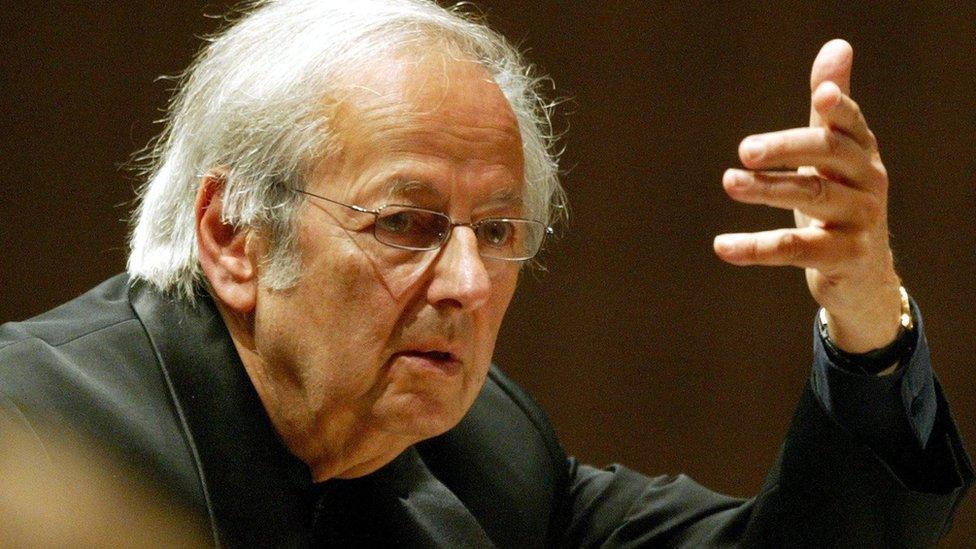Obituary: André Previn, the maestro with a common touch
- Published
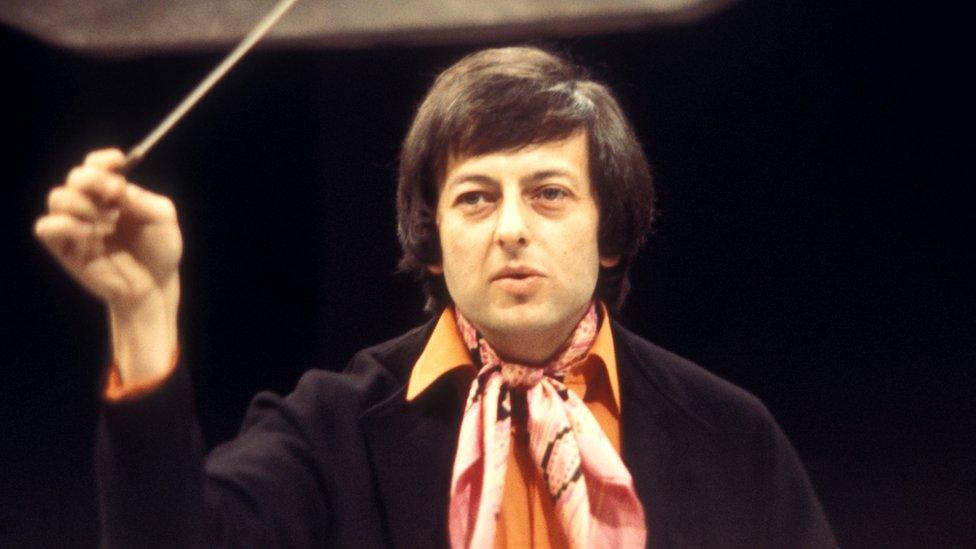
André Previn was the one of the most talented all-round musicians of the 20th Century - an Oscar-winning film composer, a jazz virtuoso and a legendary conductor.
He became a household name who was rarely off our television sets in the 1970s, and whose fame was heightened by his marriages to a string of beautiful and talented women.
But, if André Previn got into a London taxi, there was only one thing he would be asked about. It was, of course, when "Mr Preview" attempted to perform Grieg's piano concerto with Morecambe and Wise.
Nazis and Hollywood
He was born Andreas Ludwig Priwin into a Polish-Russian-French family in Berlin. His father Jack was a successful barrister and a keen piano player who encouraged his son's precocious talent for music.
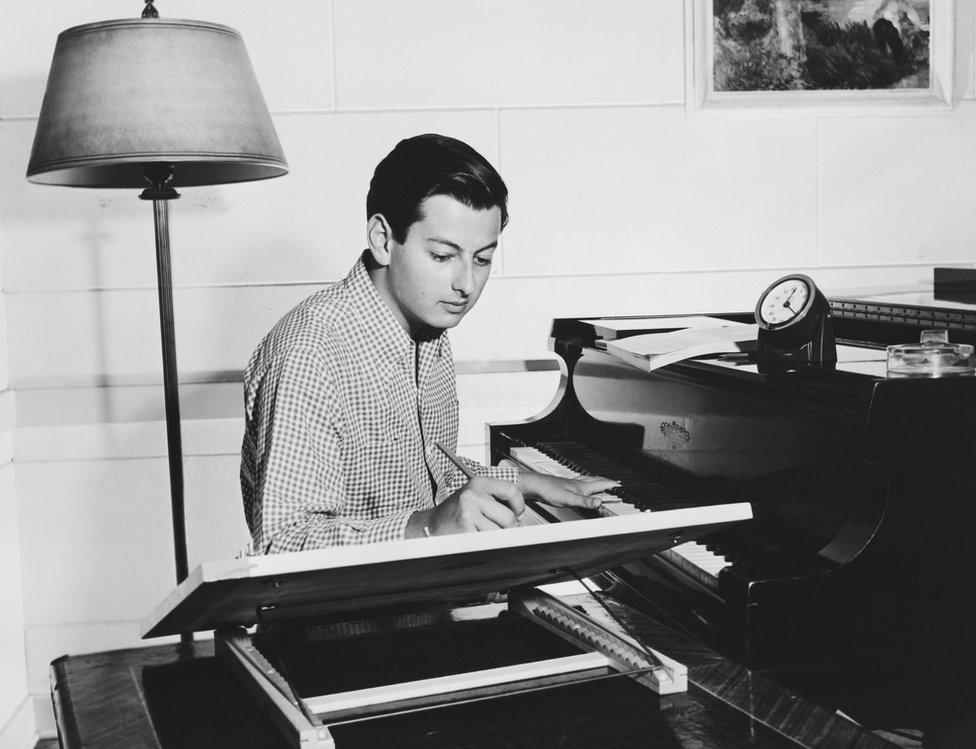
Previn earned three Academy Award nominations before the age of 25
Had he stayed in Germany, he would have become a classical musician. Identified as a prodigy at the age of five, young André studied at Berlin's prestigious Hochschule für Musik. But, in 1938, his Jewish family was forced to flee Germany and Nazi persecution.
They wound up in Los Angeles, where an uncle was head of music at Universal Studios. Unable to speak English, his father struggled - forced to abandon his lucrative legal career and scrape a living as a piano teacher. By contrast, André's rise was meteoric.
At his high school graduation ceremony, he played a duet with songwriter Richard M Sherman and found himself offered work as a musical composer and orchestrator in Hollywood.
One thing that had been lost in the hurried departure from Germany was his birth certificate. For the rest of his life, he couldn't be sure if he had been born in 1929 or 1930. But, at around the age of 16, he quit full-time education and began writing film scores for MGM.
Lassie and Ava Gardner
He started out writing the music for Lassie but soon became Hollywood's musical orchestrator of choice, earning three Oscar nominations before the age of 25.
His first two Academy Awards followed, for his work on the musicals Gigi (1958) and Porgy & Bess (1959). He did not write the famous show tunes themselves but the incidental music - roughly 90 minutes of what he described as "commercial cornball music" per film.
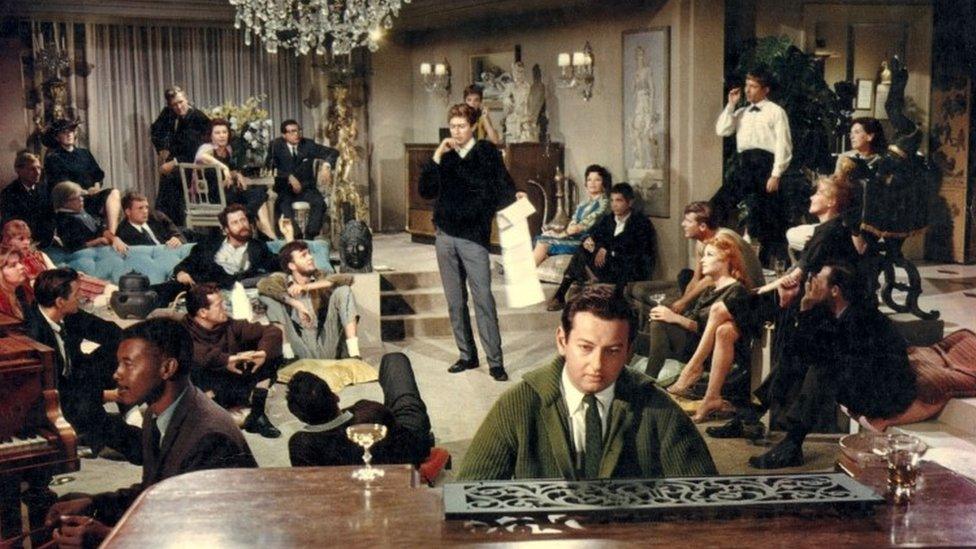
André Previn had a cameo appearance in The Subterraneans (1960)
His father, frustrated in his own career, thought André was wasting his talents. But it paid good money and Hollywood was a blast.
At times, he admitted he started out too young to have quite 'got' Tinseltown. At one party, he found himself face-to-face with Ava Gardner. The great femme fatale fluttered her eyes and asked him to take her home.
The innocent Previn missed the implied suggestion and assumed she wanted a cab. He later described his failure to take advantage as "one of the great sorrows of my life".
Marriages and Academy Awards
Previn never lacked for female attention, though, and married five times. Jazz singer Betty Bennett became his first wife; the couple quickly had two daughters and just as swiftly split. A few years later, lyricist Dory Langan became his second wife and songwriting partner.
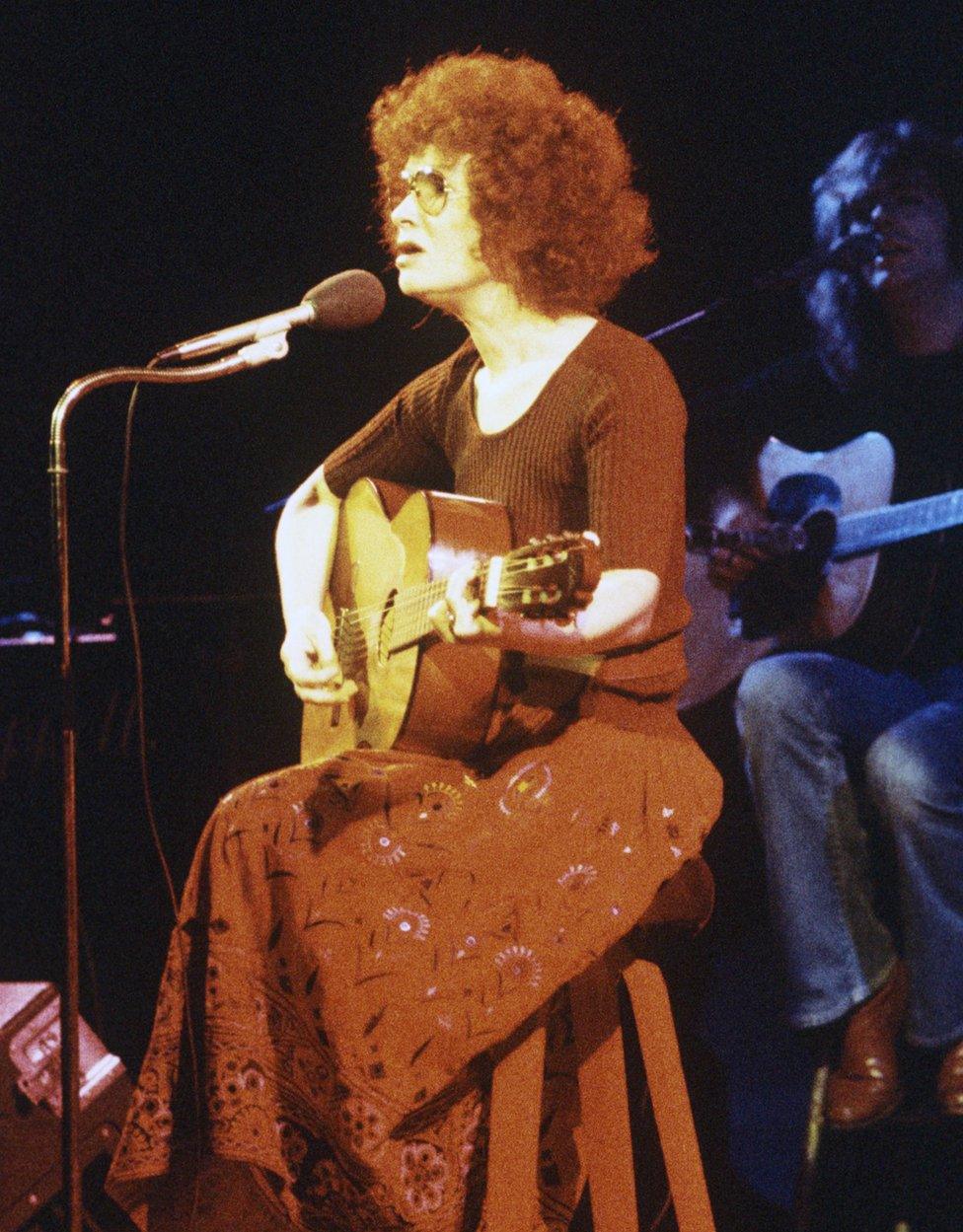
Dory Previn wrote one of her most famous songs - Beware of Young Girls - about their split

Together they wrote Oscar-nominated numbers for Pepe (1960) and Two For the Seesaw (1962). Previn chalked up two more Academy Awards for his work on yet more film adaptations of musicals: Irma la Douce (1963) and My Fair Lady (1964).
Previn was at the top of his game and then - as he entered his thirties - did something that amazed everyone. He turned his back on showbusiness, walked away from the money and returned to the world of classical music.
He had enjoyed Hollywood but it was no place for "serious" music. And the classical music establishment was suspicious of Hollywood.
When Previn tried to find work as a conductor, he found he was tainted. "They would just as soon forgive you for an axe murder as for having done a movie," he discovered.
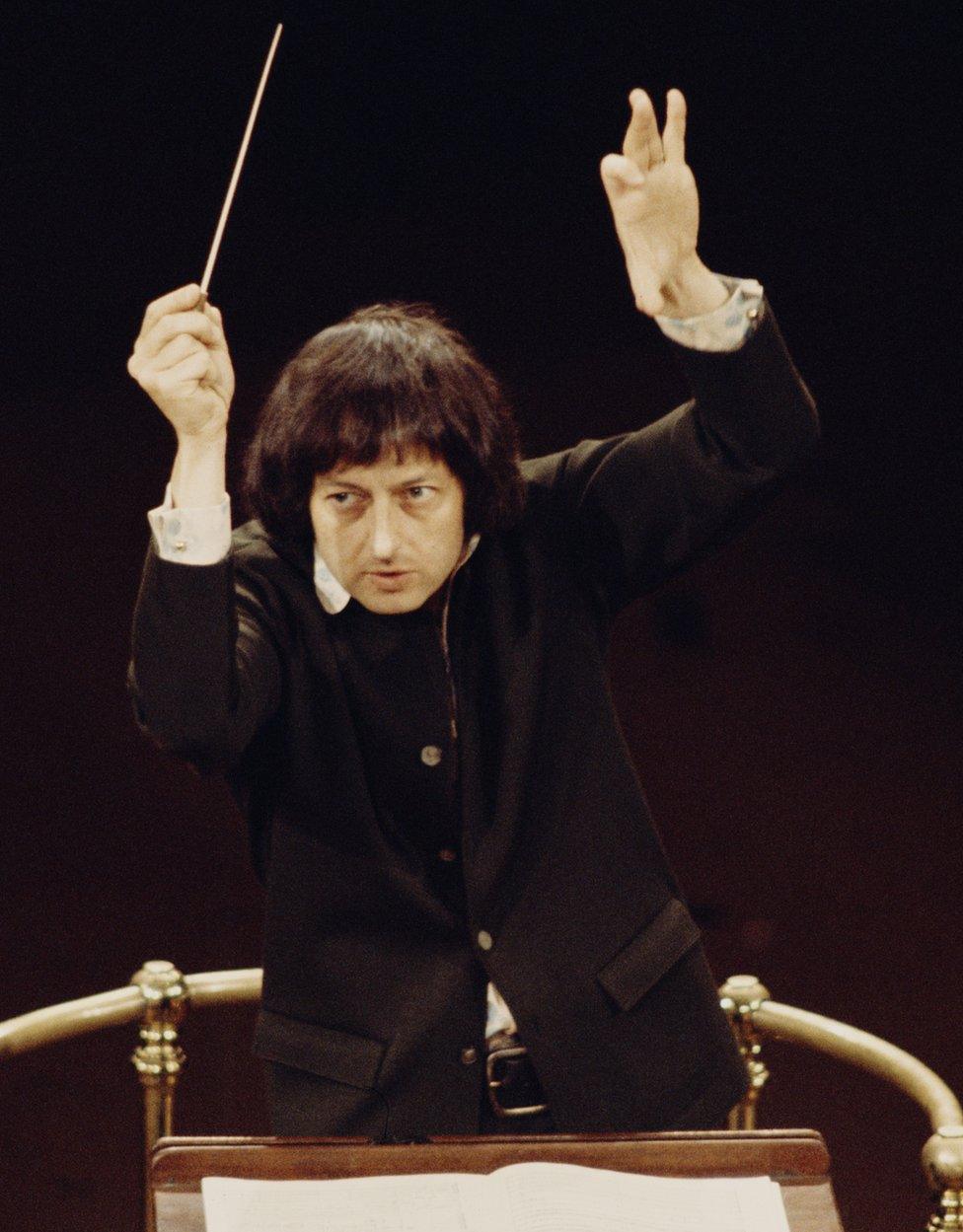
Previn found that many 'serious' musicians were suspicious of those who had worked on movies
He spent time in the doldrums before taking over from Sir John Barbirolli as musical director of the Houston Symphony Orchestra. But then he found stardom on a different continent (taking with him another change of wife).
London and Mia Farrow
In 1968, he became music director and principal conductor of the London Symphony Orchestra. It was a post he would hold for more than a decade, and was a measure of his talent that its normally unforgiving maestros took well to someone who was relatively inexperienced.
Joining him was Mia Farrow, the young movie star and former wife of Frank Sinatra. The abandoned Dory, who had a history of mental illness, fell apart at news of Farrow's affair with her husband and subsequent pregnancy. She broke down on an aeroplane, shouting and tearing at her clothes. She would spend months in a psychiatric hospital.
Dory slowly recovered, going on to write heart-rending ballads that channelled the pain of her broken marriage. Grief became the foundation of her art. Her most famous song, Beware of Young Girls, took square aim at her 25-year-old rival.
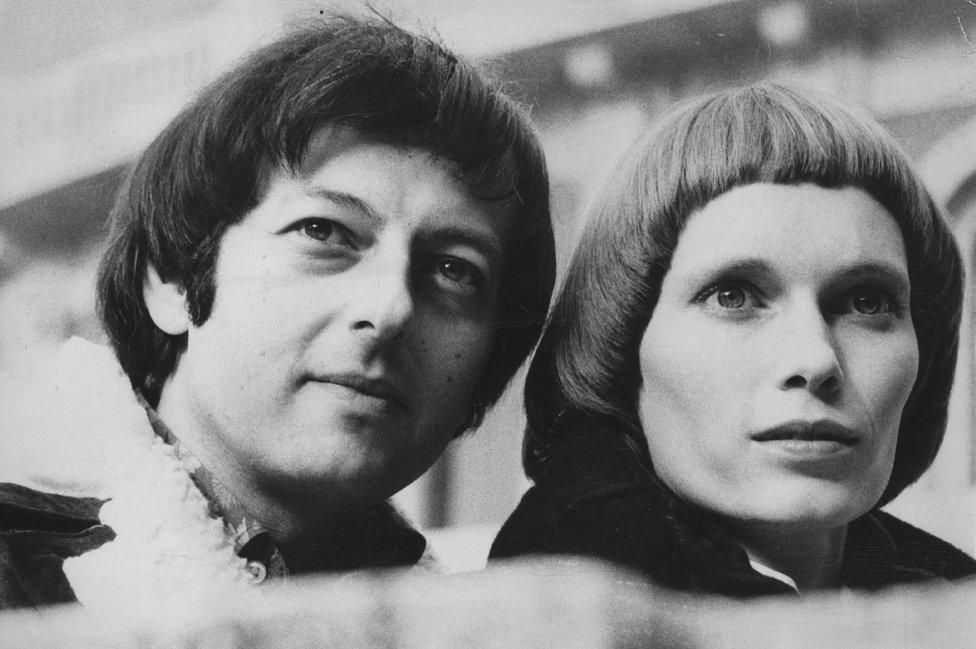
Previn married US movie star Mia Farrow and they lived in Sussex during Previn's time at the London Symphony Orchestra
Dory loathed the fact that she became best known for her break-up with Previn. They would eventually reconcile as friends - although not for another 20 years.
Meanwhile, Previn's life in London was everything he hoped for. The LSO was intellectually stimulating; his life with Farrow glamorous and full of children. The couple had three kids of their own and adopted two more from Vietnam.
To complete their family, they also welcomed a young Korean girl, Soon-Yi, in 1978. A bone scan estimated her age at between five and seven years old.
There were riotous tours with the orchestra. He was also becoming well known on British television with a series called Music Night - in which he played and conducted classical pieces and introduced a range of musical guests.
'Not too heavy on the banjos...'
But nothing prepared him for Morecambe and Wise. Their Christmas shows were a British institution and regularly watched by more than 25 million people. In 1971, Previn was invited to perform in a sketch that involved an orchestra, with the serious-minded maestro playing straight man to Eric and Ern.
His tight schedule meant they couldn't rehearse. Previn learned his lines on the way from the airport in the back of a taxi, arriving with one condition - they could make as much fun of him as they liked, but they were not to mock the music.
"If anyone thinks we are trying to be funny, we're finished," explained Eric. "We have to act as though it is very serious." The conductor had the good sense to listen.
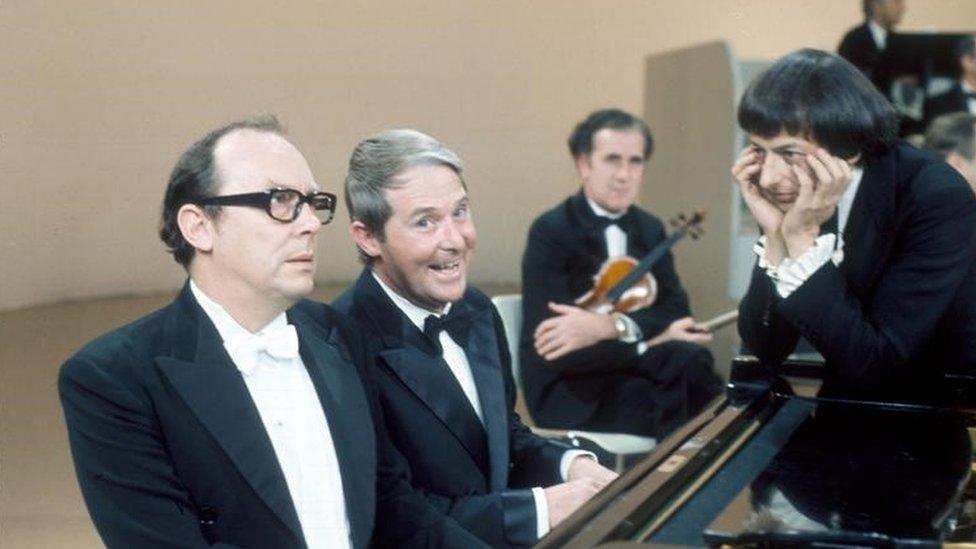
As Eric Morecambe explained, the key was to play the sketch as if they were deadly serious
Morecambe played an inept soloist who had been booked to play Grieg's piano concerto. With a flourish, he introduced Previn as "Mr Andrew Preview" and treated the orchestra with customary disdain.
"Not too heavy on the banjos," instructed Morecambe before hopelessly failing to hit his cue. He insisted the bemused conductor leap in the air so he could see him over the piano lid, then turned in such a bizarrely jaunty version of the music that Previn exploded.
"You're playing all the wrong notes," he exclaimed. "I'm playing all the right notes," came Morecambe's legendary reply. "But not necessarily in the right order."
If Previn had cracked a smile, the sketch would have been ruined. Eric had been right: the key was to play it with deadly earnest - no easy task with the audience in stitches. André deadpanned himself to comic glory and Morecambe and Wise's biographer described the show as their finest hour.
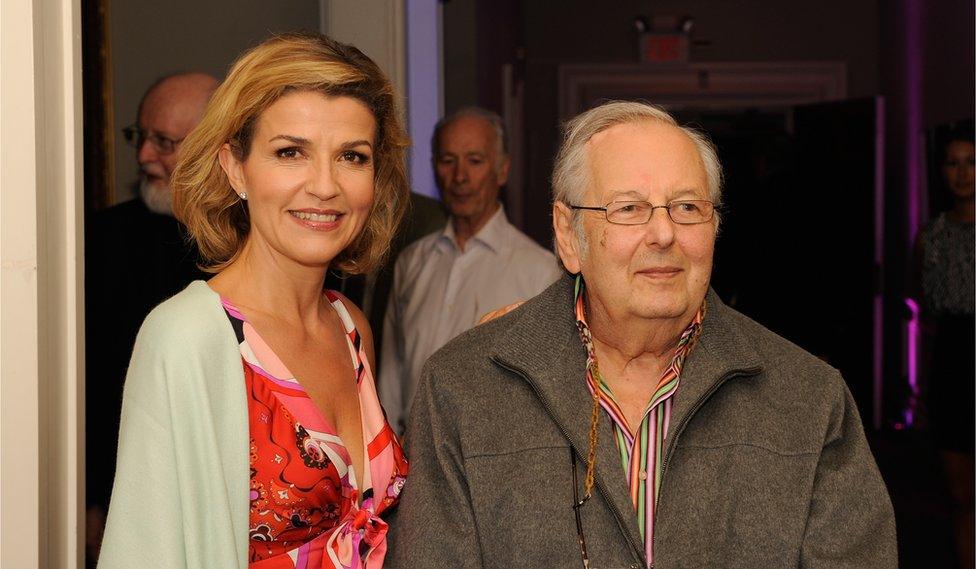
Previn continued to collaborate with his fifth wife, the violinist Anne-Sophie Mutter, after their divorce
Despite his previous misgivings, Previn returned to orchestrating music for the cinema, arranging the music for Ken Russell's The Music Lovers (1971) and - as a favour for a friend - Norman Jewison's Rollerball (1975).
He also composed music for Tom Stoppard's stage play Every Good Boy Deserves Favour (1977), which featured a full orchestra on stage alongside the actors.
At the end of the 1970s, Previn quit both his marriage with Mia Farrow and his job at the London Symphony Orchestra. He began performing jazz again, recording an album with Ella Fitzgerald.
None other than Dizzy Gillespie praised Previn's jazz technique in glowing terms. "He has the flow, you know," said the great singer and trumpeter.
In the 1980s, he joined the Los Angeles Philharmonic but left after four years amid reports of tension between him and the orchestra's management. There was also a new wife, Heather Sneddon, with whom he lived for 20 years.
Soon-Yi and Woody Allen
Then came shattering news from America. Mia Farrow had found nude photographs of their daughter, Soon-Yi in the possession of her boyfriend, Woody Allen. When challenged, they admitted having sex.

Previn's adopted daughter Soon-Yi married her mother's former boyfriend Woody Allen
There was a bitter breakdown of relations, with all sides instructing lawyers. Soon-Yi married Allen in Venice and adopted children of her own. Years later, Previn would tell a reporter that, as far as he was concerned, "Soon-Yi does not exist".
Previn kept up a hectic schedule of live performances well into his eighties. He tried his hand at composing opera, with versions of A Streetcar Named Desire and Brief Encounter - to mixed reviews.
But in a long career he chalked up 13 Oscar nominations, a lifetime Grammy and an honorary knighthood.
His final marriage came in 2002, to the violinist Anne-Sophie Mutter, whose musical ability he greatly admired. The couple lived in Germany - the land of his birth - but divorced after six years.
One day, while walking down The Strand, a taxi driver shouted at the couple through his window. "Why is he yelling 'Mr Preview'?" asked a puzzled Anne-Sophie - who, to be fair, was seven years old and living in Germany when the Morecambe and Wise sketch was broadcast.
"It's going to take me a while to explain this one," the maestro simply replied.
- Published1 March 2019
